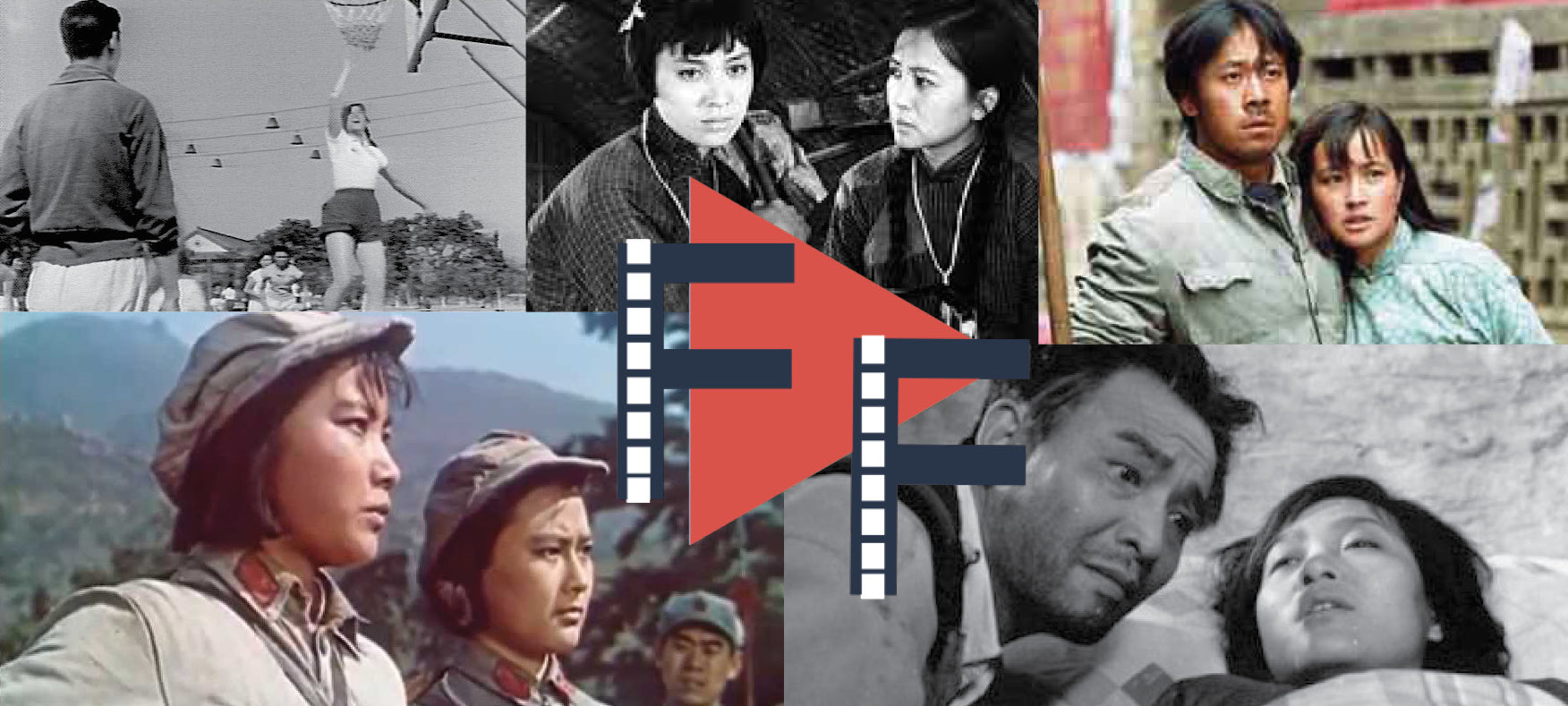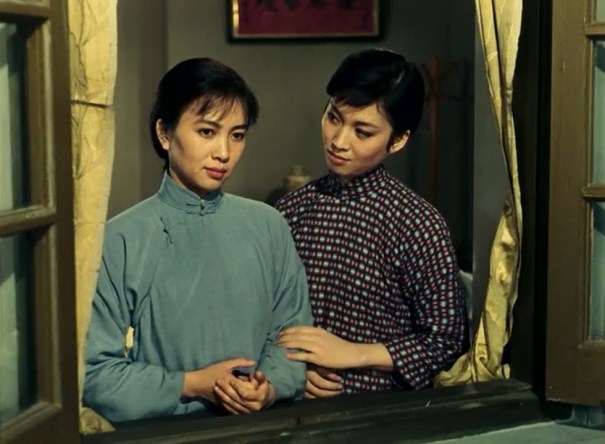5 classic movies to remember Xie Jin, the master of Chinese melodrama

Xie Jin remains relatively obscure outside of his home country, which is a shame. He directed such canonical films as The Red Detachment of Women 红色娘子军 and Hibiscus Town 芙蓉镇, and is regarded as a pioneer whose trademark style became known as the “Xie Jin model.”
(Top images, clockwise from left corner: Woman Basketball Player No. 5, Two Stage Sisters, Hibiscus Town, The Red Detachment of Women, Legend of Tianyun Mountain)

Yesterday, October 18, marked the 10th anniversary of the death of Xie Jin 谢晋, a pioneering Third Generation director whose career spanned more than 50 years. Though obscure outside of China, Xie’s work was very popular in his own country, both with audiences and critics. Blending melodrama with socialist realism, Xie and his work greatly influenced Chinese filmmakers in the decades before and after the Cultural Revolution.
Coming from a theater background, Xie began to work as an assistant director in 1949. He soon became a full-fledged director, becoming one of the most well-known directors in China before the Cultural Revolution brought his career to a halt. In the 1980s, Xie experienced the heyday of his career, to the extent that his trademark style became known as the “Xie Jin model.” His movies were loved by the public and showered with awards, although some radical critics and younger filmmakers criticized him as too conservative and safe.
While his movies might not be as challenging or experimental as the kind of work we associate with China’s Fifth and Sixth Generations of filmmakers, Xie produced a handful of beautiful classics. His work often features ordinary people grappling with the uproars of 20th-century Chinese history, with an emphasis on female characters. They might be sentimental, but they are rarely simplistic, and always compelling. Xie deserves to be better known in the English-speaking world, so without further ado, here are five movies that rank among the best of his career.
Woman Basketball Player No. 5 女篮5号 (1957)
Xie’s first major success, Woman Basketball Player No. 5, was one of the most popular Chinese movies of the 1950s. During a time when the Chinese government pushed for stories about workers, peasants, and soldiers, Xie’s colorful sports saga must have stood out from the crowd. Its love story subplot and youthful optimism won over audiences, and it was also unique in that Xie used actual athletes in his casting. The lead actress, Cao Qiwei 曹其纬, was in fact a real volleyball player who would go on to play for China’s national team.
In the movie, Cao plays Lin Xiaojie, a teenage girl training to become a basketball player in Shanghai. Xiaojie has the potential to be a great player, but her family doesn’t approve of her hopes of becoming an athlete, and her boyfriend even encourages her to drop sports and go to university instead. Xiaojie’s coach, a former basketball star named Tian Zhenhua, won’t let her give up so easily. He pushes Xiaojie and the other players to train hard, and from flashbacks about his unhappy past, we learn why he’s so eager to put together such a strong team.
Compared to the other selections on this list, Woman Basketball Player No. 5 is a bit short and thin. It has a slow start, but with the more we learn about Coach Tian, gradually becomes more interesting. Overall, it’s a worthwhile watch, and from a wider perspective, the beginnings of Xie’s renowned style.
The Red Detachment of Women 红色娘子军 (1961)
The Red Detachment of Women, based on a novel by author Liang Xin 梁信, furthered Xie’s critical and popular reputation. The movie was inspired by the Special Company of the Red Army’s Second Independent Division, an all-female group of soldiers who fought against the Guomindang on Hainan in 1931. It follows a fictional woman named Wu Qinghua, a peasant who leaves her old miserable life behind to take up the Communist cause.
When the movie begins, Qinghua is a slave who runs away from her master, a cruel landlord named Nan Batian. Sadly, her escape fails, and Qinghua is hung by her hands and whipped in prison. Impressed by Qinghua’s rebellious spirit, a rich traveler named Hong offers to buy the girl, supposedly so she can help his mother. After they leave town, Qinghua’s new owner reveals that he’s an undercover Communist officer. Hong sets Qinghua free, but she has no place to go. Nan killed her father three years earlier, and left her mother to starve. With nothing to lose, Qinghua joins the women’s army, ready to fight against Nan and the other enemies of the people.
In reality, the real women’s army lost its fight against the Nationalists, but The Red Detachment of Women ends happily. Before the crowd of 120 female soldiers, Qinghua rouses the army to keep fighting, swearing that “We will fight until the entire proletariat is liberated.” In 1964, the movie was adapted into a ballet of the same name, which was itself adapted for the big screen in 1972. During the Cultural Revolution, the ballet and remake were pretty popular works, although Xie’s original version was, oddly enough, banned.
https://www.youtube.com/watch?v=zoPM9d18e9o
Two Stage Sisters 舞台姐妹 (1964)
A fascinating mix of Xie’s usual themes with traditional Chinese opera, Two Stage Sisters (sometimes simply Stage Sisters) was one of the last great mainland movies made before the Cultural Revolution. Taking place between 1935 and 1950, the story traces the careers of actresses Chunhua and Yuehong, from their days in a traveling opera troupe to the chaotic years of the Second Sino-Japanese War and the Chinese Civil War.
The women initially get their start performing Shaoxing opera, a style of opera from Zhejiang Province that uses actresses to play male roles. Chunhua joins the troupe to escape an arranged marriage, being taken under the wing of a teacher named Xing. She’s trained to play dàn 旦 (female) roles, while Xing’s daughter Yuehong acts as her partner in xiǎoshēng 小生 (male) roles. The two actresses become close friends, but after becoming stars in Shanghai, their relationship becomes strained over the years. Chunhua develops an interest in left-wing politics, and Yuehong leaves the world of the stage to become her manager’s mistress.
While Two Stage Sisters is considered a classic today, it wasn’t released to the public until after the Cultural Revolution, in 1979. Authorities attacked the movie even before its release, due to its association with screenwriter and Deputy Minister of Culture Xia Yan 夏衍. Jiang Qing 江青 hated Yan, and because he helped Xie with the screenplay of Two Stage Sisters, the movie became a political target. When the Cultural Revolution began, the criticism of the movie spread to Xie as well. He was punished for “bourgeois humanism,” and although he survived the Revolution, both his parents committed suicide.
Legend of Tianyun Mountain 天云山传奇 (1980)
Xie wasn’t able to escape forced labor and house arrest during the Cultural Revolution, but he was one of the few directors who ended up being able to make movies during the period. In the early 1970s, Xie was brought out of political exile to help Jiang Qing 江青 — a.k.a. Madame Mao — film one of her revolutionary operas, On the Docks 海港. Jiang was hard to please, and the movie ultimately had to be shot three times, one of the productions ordered shelved because Jiang didn’t like the exact shade of the heroine’s red scarf. Two years after this tortuous process, Xie managed to make Chunmiao 春苗, a propaganda piece about a girl who studies to become a barefoot doctor.
Following Chunmiao, Xie directed two other movies near the close of the 1970s, but it was really Legend of Tianyun Mountain that launched his comeback. Set against the backdrop of the Anti-Rightist Movement, the movie tells the story of Luo Qun and Song Wei, a couple whose relationship is ruined after Luo is accused of being a rightist. While Qun is forced to work in the countryside, Wei marries another man, and Qun ends up marrying his former lover’s friend. Two decades pass, and when Wei hears that Qun is still alive and living in disgrace, she becomes determined to restore his reputation.
Legend of Tianyun Mountain hit the public hard; Xie received thousands of letters from fans who thanked him for portraying the pain and grief of the innocent people caught up in the Anti-Rightist Movement. It was also a success at the first Golden Rooster Awards, winning awards in five different categories, including best director and best feature. During the rest of the decade, Xie would continue exploring more recent Chinese history in his work. His follow-up, The Herdsman 牧马人 (1982), would cover a teacher-turned-rancher’s life from the Anti-Rightist Movement to the Cultural Revolution, while Wreaths at the Foot of the Mountain 高山下的花环 (1984) focused on soldiers in the 1979 Sino-Vietnamese War.
https://www.youtube.com/watch?v=ZmV5M9us_bA
Hibiscus Town 芙蓉镇 (1986)
Perhaps Xie’s greatest work, Hibiscus Town was adapted from a novel by the author Gu Hua 古华. The town in the title is fictional, though Gu based it on his own life growing up in rural Hunan Province. As the movie begins in 1963, life couldn’t be better for Hu Yuyin, a peasant woman whose rice beancurd business has done so well that she’s built a new house. Yuyin’s life is turned upside down, however, when a Communist cadre named Li Guoxiang comes to town. Guoxiang is the on the look-out for rightists and “capitalist roaders,” individuals who were alleged to be pushing China onto the road of capitalism.
Due to their business activities, Yuyin and her husband Guigui are easy targets for Guoxiang’s campaign. They’re labeled “new rich peasants” after a struggle session, and lose their money, house, and business. Guigui is eventually executed, leaving Yuyin to work as a street-sweeper. Slowly, she falls in love with Qin Shutian, an eccentric folk-song collector who was branded a rightist. While the couple carry on secretly, the Cultural Revolution wrecks further havoc in their town, even turning Guoxiang into a victim.
By the time Hibiscus Town was released, China’s Fifth Generation of filmmakers were busily changing the conventions of Chinese cinema. This younger and more artistic group, represented by the likes of Chen Kaige and Zhang Yimou, criticized Xie’s movie for its conservatism and melodrama. Admittedly, Hibiscus Town might feel old-fashioned compared to works by Xie’s younger contemporaries, but it’s no exaggeration to call it a masterpiece. Xie’s direction here is at the peak of his powers, depicting Yuyin’s struggle to survive with great humanity and empathy. It isn’t only one of the best movies made about the Cultural Revolution, but one of the best Chinese movies ever made.
Also see:
5 influential movies from the Fifth Generation of Chinese filmmakers
Film Friday is The China Project’s film recommendation column. Have a recommendation? Get in touch: editors@thechinaproject.com










